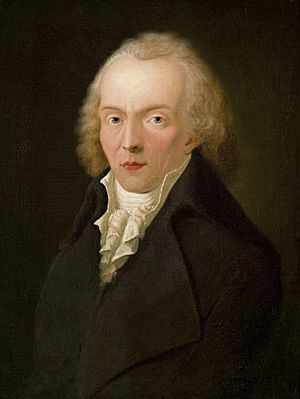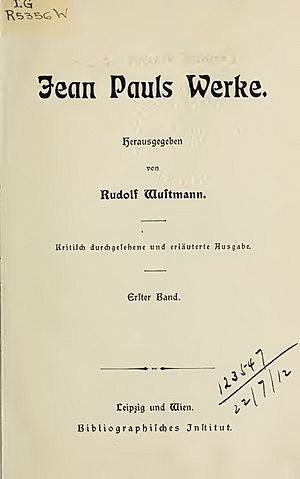Jean Paul facts for kids
Quick facts for kids
Jean Paul
|
|
|---|---|

Portrait by Heinrich Pfenninger, 1798
|
|
| Born | Johann Paul Friedrich Richter 21 March 1763 Wunsiedel, Holy Roman Empire |
| Died | 14 November 1825 (aged 62) Bayreuth, German Confederation |
| Pen name | Jean Paul |
| Occupation | Novelist |
| Nationality | German |
| Alma mater | University of Leipzig |
| Period | 1783–1825 |
| Genre | Humorous novels and stories |
| Subject |
|
| Literary movement | Romanticism |
| Notable awards | PhD (Hon): University of Heidelberg (1817) |
Jean Paul (born Johann Paul Friedrich Richter, 21 March 1763 – 14 November 1825) was a famous German Romantic writer. He is best known for his funny novels and stories.
Contents
Life and Early Works
Jean Paul was born in Wunsiedel, a town in the Fichtelgebirge mountains of Germany. His father was an organ player there. When Jean Paul was young, his family moved a few times because his father became a pastor. Sadly, his father died in 1779, leaving the family very poor. Jean Paul later said that a father's words to his children are heard clearly by future generations.
After finishing school, Jean Paul went to the University of Leipzig in 1781. He first planned to become a pastor like his father. But he found that he was not interested in theology. Instead, he spent his time studying literature. Because he struggled to support himself, he returned home in 1784 to live with his mother.
From 1787 to 1789, he worked as a tutor in a village called Töpen. Then, from 1790 to 1794, he taught children in a school he started in Schwarzenbach.
Jean Paul began his writing career with books like Grönländische Prozesse ("Greenland Lawsuits") in 1783–84. He also wrote Auswahl aus des Teufels Papieren ("Selections from the Devil's Papers") in 1789. These early books were not very popular. Jean Paul himself later didn't like their mocking style.
Becoming a Famous Writer
Jean Paul's way of thinking changed a lot after a special moment in 1790. He had a vision of his own death, which deeply affected him. His next book, Die unsichtbare Loge ("The Invisible Lodge"), came out in 1793. He used the pen-name Jean Paul for this book, honoring Jean-Jacques Rousseau. This book showed the writing style that would soon make him famous. Critics quickly saw how powerful it was.
Because Die unsichtbare Loge was so well-received, Richter wrote many books quickly. These included Leben des vergnügten Schulmeisterleins Maria Wutz ("Life of the Cheerful Schoolmaster Maria Wutz", 1793). His book Hesperus (1795) became a bestseller and made him very famous. Other works followed, like Leben des Quintus Fixlein ("Life of Quintus Fixlein", 1796) and the novel Siebenkäs (1796–97).
Siebenkäs had a slightly supernatural theme. It involved a Doppelgänger (a look-alike) and a character pretending to die. This caused some discussion about its meaning, but it also made more people aware of Jean Paul. These books secured his place in German literature. For the rest of his life, people eagerly awaited his new works.
Life in Weimar and Bayreuth
After his mother passed away in 1797, Richter moved to Leipzig. The next year, he went to Weimar. There, he began working on his biggest novel, Titan, published from 1800 to 1803. He became friends with famous people in Weimar, like Johann Gottfried Herder. However, he never became close to Johann Wolfgang von Goethe or Friedrich Schiller. They did not like his writing style. Still, Jean Paul was popular in society because he was a great talker and had a kind personality.
In 1801, he married Caroline Meyer. They lived in different towns before settling in Bayreuth in 1804. Jean Paul lived a peaceful and happy life there, always busy with his writing. In 1808, he received a yearly payment from Prince Primate Karl Theodor Anton Maria von Dalberg. This helped him not worry about money. The king of Bavaria later continued this payment.
Later Works and Final Years
After Titan, Jean Paul wrote Flegeljahre ("The Awkward Age", 1804–5). His later imaginative books included Dr Katzenbergers Badereise ("Dr Katzenberger's Trip to the Medicinal Springs", 1809). He also wrote Des Feldpredigers Schmelzle Reise nach Flätz ("Army Chaplain Schmelzle's Voyage to Flätz", 1809).
Jean Paul also wrote about his ideas on art in Vorschule der Aesthetik ("Introduction to Aesthetics", 1804). He shared his thoughts on education in Levana, oder Erziehungslehre ("Levana, or, Pedagogy", 1807). He also wrote about current events, supporting peace and freedom of thought.
He supported the younger writer E. T. A. Hoffmann. Richter even wrote the introduction for Hoffmann's collection of short stories in 1814.
In September 1821, Jean Paul's only son, Max, died. This was a huge shock, and Jean Paul never fully recovered. He lost his eyesight in 1824. He passed away from a condition called dropsy (edema) in Bayreuth on 14 November 1825.
What Made His Work Special
Jean Paul holds a unique place in German literature. Some people greatly admire him, while others don't find his work interesting. He often made his novels very free in their structure. One writer said his novels were like talking to himself, with readers joining in.
Jean Paul loved to play with many funny and strange ideas. His writing is known for wild comparisons and plots that wander off topic. He mixed deep thoughts with ideas about writing. You can find sharp humor, strong satire, and gentle comedy in his books. He also included realistic scenes, romantic stories, and comments on society and politics. His quick changes in mood even inspired the composer Schumann.
His novels were especially liked by women. This is because Jean Paul created female characters with great understanding and depth. No one in German literature had shown women with such detailed feelings before. Jean Paul himself was said to be very friendly and witty. But he was also very emotional, almost childlike, and would easily cry. From his works, it's clear he loved not just literature but also astronomy and other sciences.
His Unique Style
It's not surprising that Jean Paul's relationship with famous writers like Goethe and Schiller was complicated. Schiller once said Jean Paul was as strange to him as someone from the moon. He thought Jean Paul could have been great if he used his talents better. However, Herder and Wieland truly valued his work and supported him.
Even though he kept his distance from the classic writers, Jean Paul was also different from the Romantics. He had a special kind of humor that was rare at the time. He was also one of the first to think deeply about what humor is.
Jean Paul believed that both the Enlightenment and deep philosophy had not fully succeeded. He developed a way of thinking that was realistic and had a humorous acceptance of life. He was one of the first to support the ideas of the philosopher Arthur Schopenhauer. He didn't try to teach lessons but to show human happiness, even in a world that felt increasingly distant.
Jean Paul was also the first writer to use and name the idea of the Doppelgänger. This is a literary idea where a character has a look-alike or a double. He used this idea in many ways in his stories. In his novel Siebenkäs, he described a Doppelgänger as "people who see themselves."
Fighting for Freedom
Jean Paul always fought for freedom of the press. His efforts against censorship were stronger than many of his time. In his book Freiheitsbüchlein (1805), he argued that books belong to all people. He believed they should be able to influence all times, not just the present. He said that a censor who stops a book from being published judges not only today's society but all future societies. He thought censorship was impossible because no one could truly be good enough to decide what everyone should read.
After the big changes of the 1700s, the idea of complete freedom of opinion, speech, and printing seemed possible. Even when Napoleon's army controlled Germany, Jean Paul continued to speak out for reason. He did this in his Friedens-Predigt an Deutschland (1808). In his Politische Fastenpredigten (1816), he warned rulers that they cannot control people's minds. He said that trying to control thoughts with police actions would only make them explode later, like a champagne bottle.
Other Interesting Facts
Rudolf Steiner, a famous thinker, put together many of Jean Paul's works into a collection. Steiner often talked about how Jean Paul, at age 7, realized he was an individual "Ego." Jean Paul was surprised to understand, "I am an I."
Quotations
- The long sleep of death closes our scars, and the short sleep of life our wounds. (Hesperus, XX)
Works
- Abelard und Heloise 1781
- Grönländische Prozesse 1783–1784
- Auswahl aus des Teufels Papieren 1789
- Leben des vergnügten Schulmeisterlein Maria Wutz in Auenthal. Eine Art Idylle 1790
- Die unsichtbare Loge 1793
- Hesperus 1795
- Biographische Belustigungen 1796
- Leben des Quintus Fixlein 1796
- Siebenkäs 1796
- Der Jubelsenior 1797
- Das Kampaner Tal 1797
- Konjekturalbiographie 1798
- Des Luftschiffers Giannozzo Seebuch 1801
- Titan 1800–03
- Vorschule der Aesthetik 1804
- Flegeljahre (unfinished) 1804–05
- Freiheitsbüchlein'' 1805
- Levana oder Erziehlehre 1807
- Dr. Katzenbergers Badereise 1809
- Des Feldpredigers Schmelzle Reise nach Flätz 1809
- Leben Fibels 1812
- Bemerkungen über uns närrische Menschen
- Clavis Fichtiana
- Das heimliche Klaglied der jetzigen Männer
- Der Komet 1820–1822
- Der Maschinenmann
- Die wunderbare Gesellschaft in der Neujahrsnacht
- Freiheits-Büchlein
- Selberlebenbeschreibung posthum 1826
- Selina posthum 1827
Images for kids
See also
 In Spanish: Jean Paul para niños
In Spanish: Jean Paul para niños
 | Frances Mary Albrier |
 | Whitney Young |
 | Muhammad Ali |



